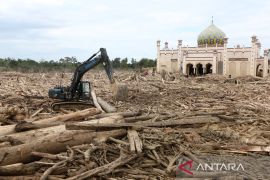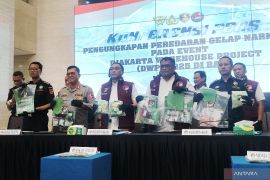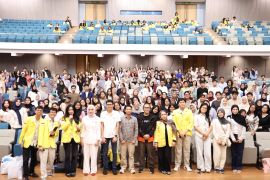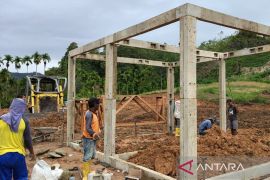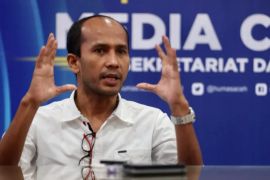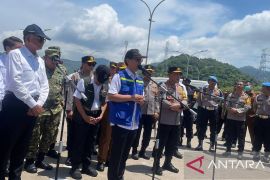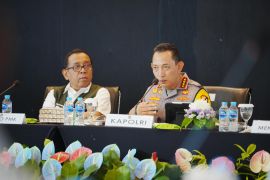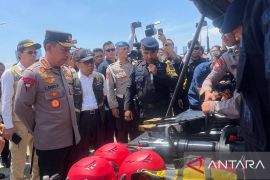Similarly to the Mekong River, the Batanghari River in Jambi is a potential area to be one of the biggest pangasius culture centers in Indonesia. The Indonesia's area and pangasius resource potency is quite reliable to match the Vietnamese one. As a matter of fact, if Indonesia could leverage, empower, and implement the available technological assets, the Indonesia's pangasius production could exceed the Vietnam's. Thus was confirmed by the Directorate-General of the Fishery Culture (DGFC), Slamet Soebjakto, during the working visit program in Tanjung Jabung Timur District, Jambi, Friday (May,3).
Slamet continued, Indonesia is possible to be the world's biggest pangasius producers. This is in line with the Ministry of Marine Affairs and Fisheries' (MMAF) policy that selects the pangasius as one of the key commodities for the fishery culture industrialization. Therefore, this commodity will be simultaneously increased each year. Furthermore, Indonesia has a more derivative pangasius culture resouce potency - the abundance of the rivers, lakes, cisterns, and artificial ponds. "The pangasius export opportunity shows a promising interest in the international markets, as well as in the domestic markets, because the pangasius is one of the favorite menus for the domestic society. Referring to this consideration, the pangasius is a worth commodity to be developed and industrialized." revealed Slamet.
The abundancy of the pangasius seed and the clean rivers are also crucial factors to help producing high-quality pangasius. Therefore, MMAF in conjunction with DGFC will develop maximize the pangasius production in a number of locations - Tanjung Jabung Timur District among others, while the soon-to-be location pilot is in the Sabak Timur Sub-District. DGFC will work closely with the Jambi Province and the Tanjung Jabung Timur District Governments. DGFC will set one-hectare area into two tidal irrigation system-equipped pangasius conservation pilot ponds. "The goal of the presence of the pilot ponds is to implement a new aquaculture system by leveraging the technology and the Jambi's natural resources, which, at last, will improve and increase the pangasius production," Added Slamet.
Located in the east coast of the Sumatera, Tanjung Jabung Timur, through its Batanghari River, is a potential area to be a pangasius production center. The most suitable system to be implemented in that area is the tidal irrigation system, which takes advantages of the stream of the Batanghari River. "With the ebb and flow occurred twice in the Batanghari river, automatically keeping the water quality. This enables the pangasius fish grows faster," explained Slamet.
The fodder availibility
According to Slamet, there are three pangasius production supporting factors; the fodder availability, the superior parent and the quality seed - Jambi has already possessed all three of them. The Fresh Water Culture Center Jambi (FWCC) has developped the seed of Siam pangasius whose flesh is white, which is different with the local pangasius whose flesh is red. Meanwhile, to ensure the fodder availability, the Jambi Province Government plans to build a fodder factory, supporting the pangasius culture in Jambi. The establishment of the factory will involve the national and local governments, Pangasius Culturer Association Jambi (PCAJ), other private parties and the banking party. "The collaboration will be always undertaken in order to give the best for the growth of the fishery culture, which will enhance the society's welfare at last," said Slamet.
Slamet added, the fishery culture facility and infrastructure establishments, like the fish fodder factory, will significantly support the fishery culture program. The program is a manifestation of the local government's concerns to the fishery culture development and the welfare of the culturers. Moreover, the Jambi Province's Fish Processing Unit (FPU), which processes up to five tones of pangasius each day, really helps the pangasius production uptake. Once the processing capacity is fulfilled, the Jambi District government plans to expand the establishment of other FPUs throughout the pangasius culture centers with the tidal irrigation system. "The local government's program will significantly simplify the marketing access of the pangasius production," added Slamet.
For more information, please contact Indra Sakti, SE, MM, The Head of Data Statistic and Information Center, The Ministry of Maritime Affairs and Fisheries. (Ph. +62818159705)
Editor: PR Wire
Copyright © ANTARA 2013
